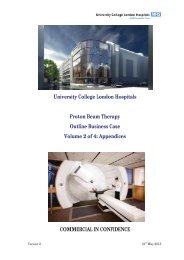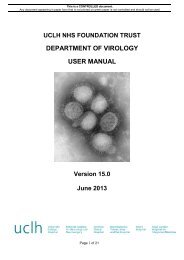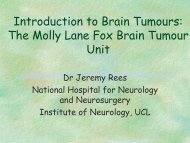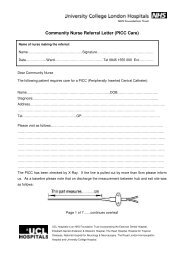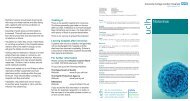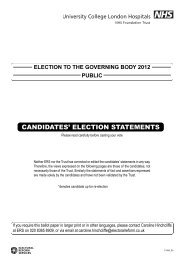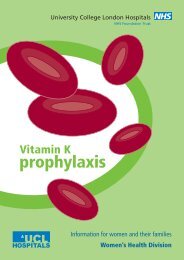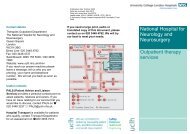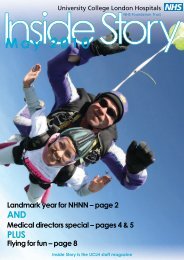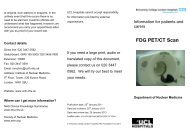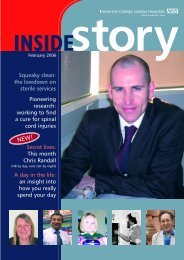How patients have helped us with our research - University College ...
How patients have helped us with our research - University College ...
How patients have helped us with our research - University College ...
You also want an ePaper? Increase the reach of your titles
YUMPU automatically turns print PDFs into web optimized ePapers that Google loves.
10 8 UCLH BIOMEDICAL RESEARCH UNIT<br />
Community groups make sure genetic cancer<br />
screening study happens<br />
The Genetic Cancer Prediction<br />
through Population Screening<br />
(GCaPPS) study is looking<br />
at the feasibility of offering<br />
everybody in the population<br />
a genetic test (in the form of<br />
a straightforward blood test)<br />
to see who is at high risk of<br />
developing cancers linked to<br />
certain genetic alterations.<br />
Community members <strong>have</strong><br />
been helping <strong>research</strong>ers recruit<br />
volunteers and deal <strong>with</strong> some<br />
of the difficult sensitivities<br />
surrounding genetic testing.<br />
The GCaPPS study<br />
The study is looking specifically<br />
at screening for faults in two<br />
genes – BRCA1 and BRCA2.<br />
People who <strong>have</strong> inherited<br />
faults in these genes are at<br />
high risk of developing breast,<br />
ovarian or prostate cancers.<br />
Researchers are comparing the<br />
effects of j<strong>us</strong>t testing people<br />
who <strong>have</strong> a family history of<br />
these particular cancers <strong>with</strong><br />
the effects of screening people<br />
regardless of family history.<br />
They want to know which kind<br />
of screening is the best way<br />
forward.<br />
“We need to understand how<br />
acceptable offering [testing]<br />
on a population basis will be,<br />
whether it will detect more<br />
people at risk, how it will affect<br />
quality of life, and how many<br />
people will opt for screening<br />
and prevention,” says Dr Ranjit<br />
Manchanda of the Elizabeth<br />
Garrett Anderson Institute<br />
for Women’s Health at UCL,<br />
which is coordinating the<br />
GCaPPS study.<br />
To do this, <strong>research</strong>ers are<br />
working <strong>with</strong> people of<br />
Ashkenazi Jewish origin who<br />
are 10 to 20 times more likely<br />
to carry a faulty gene than the<br />
general population. Usually<br />
people of Ashkenazi Jewish<br />
origin are only tested on the<br />
NHS if they <strong>have</strong> a known<br />
strong family history of the<br />
three cancers or if a relative has<br />
been diagnosed under the age<br />
of 50. But this can miss a lot of<br />
people at risk. What the study<br />
wants to do is to recruit 10,000<br />
people of Ashkenazi Jewish<br />
origin to be tested regardless of<br />
their family history.<br />
Groups <strong>helped</strong><br />
<strong>research</strong>ers deal<br />
<strong>with</strong> genetic testing<br />
sensitivities<br />
Partnership working<br />
Given the sensitivities involved<br />
and the potential implications<br />
for people being tested, it has<br />
taken extensive partnership<br />
working to get the study off the<br />
ground.<br />
Liz Engel, from the Eve Appeal<br />
charity, <strong>helped</strong> <strong>with</strong> patient<br />
information



